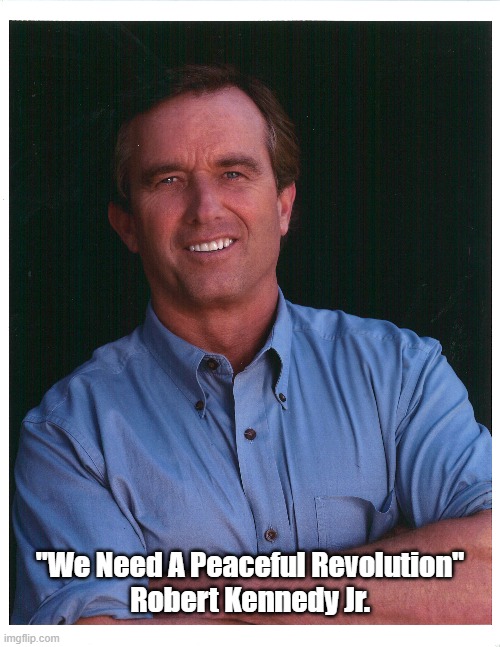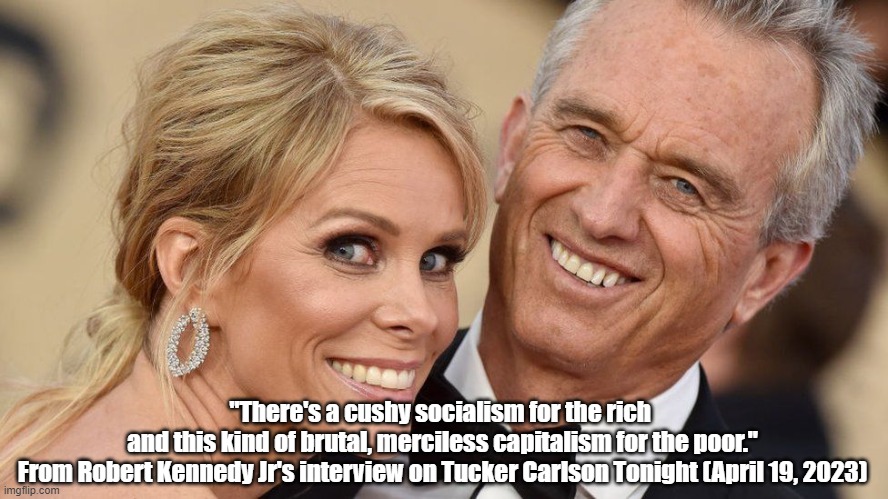He will be, by far, the easiest Republican to defeat.
And the "down ticket" impact of Trump's candidacy is very likely to solidify Democrats' control of the Senate, also enabling them to win back the House.
That said, if there were to be any other Republican candidate than Trump, let it be Robert F. Kennedy, Junior!
No one in American politics is a more diehard opponent of Cowboy Capitalism than RFK Jr.
No one.
And he has the record to prove it.
It is enlightening to read Kennedy’s Wikipedia page, particularly the section on environmentalism, which is, arguably, the most important issue in contemporary American politics. Robert F. Kennedy Jr. - Wikipedia
COVID treatments weren’t suppressed to OK vaccines’ emergency use
Facebook Thread About Big Pharma Malfeasance, And The First Ever Woman Editor Of "The New England Journal Of Medicine," Maria Angell's Spot-On Criticism Of The Pharmaceutical Industry
Trump's Handpicked Kansas Politician, Kris Kobach, Is Emblematic Of The Bullsh*t Nonsense That Has Become The Bogus Essence Of The Republican Party
1 John 4:18, "There Is No Fear In Love." But Fear Is Fundamental To Every "Conservative" "Christian" Church
"The Role Of Fear And Anxiety In Political Affiliation": How The Values Of "Strict Father" -- Or "Nurturant Parent" -- Control Our Political Views
How To Save "Conservative" "Christians" From Themselves: An Experiment In Reading About Notable Human Beings
Republican Vision Of A Reading List That's Acceptable For Public Instruction (And "A Failsafe Way To Restore Integrity And Vigor To America's Sick Body Politic: Two Years Of American History - Taught Dialectically - As A Prerequisite For High School Graduation")
Please consider this summary of Robert Kennedy Jr's lifelong far-left political activism, excerpted from his Wikipedia page. https://en.wikipedia.org/wiki/Robert_F._Kennedy_Jr.
Cleantech and renewable energy infrastructure entrepreneurship
In 1998, Kennedy, Chris Bartle and John Hoving created a bottled-water company, Keeper Springs, which donated all of its profits to Waterkeeper Alliance.[77] In 2013, Kennedy and his partner sold the brand to Nestlé in exchange for a donation to local Waterkeepers.[78]
Kennedy was a venture partner and senior advisor at VantagePoint Capital Partners, one of the world's largest cleantech venture capital firms. Among other activities, VantagePoint was the original and largest pre-IPO institutional investor in Tesla. VantagePoint also backed BrightSource Energy and Solazyme, amongst others. Kennedy is a board member and counselor to several of Vantage Point's portfolio companies in the water and energy space, including Ostara, a Vancouver-based company that markets the technology to remove phosphorus and other excessive nutrients from wastewater, transforming otherwise pollution directly into high-grade fertilizer.[79] He is also a senior advisor to Starwood Energy Group and has played a key role in a number of the firm's investments.[80]
He is on the board of Vionx, a Massachusetts-based utility scale vanadium flow battery systems manufacturer. On October 5, 2017, Vionx, National Grid and the U.S. Department of Energy completed the installation of advanced flow batteries at Holy Name High School in the city of Worcester, Massachusetts. The collaboration also includes Siemens and the United Technologies Research Center and constitutes one of the largest energy storage facilities in Massachusetts.[81]
Kennedy is a Partner in ColorZen, which offers a turnkey cotton fiber pre-treatment solution that reduces water usage and toxic discharges in the cotton dyeing process.[82]
Kennedy was a co-owner and Director of the smart grid company Utility Integration Solutions (UISol),[83] which was acquired by Alstom. He is presently a co-owner and Director of GridBright, the market-leading grid management specialist.[84]
In October 2011, Kennedy co-founded EcoWatch, an environmental news site. He resigned from the board of directors in January 2018.[85]
Minority and poor communities
In his first case as an environmental attorney, Kennedy represented the NAACP in a lawsuit against a proposal to build a garbage transfer station in a minority neighborhood in Ossining, New York.[86]
In 1987, he successfully sued Westchester County, New York, to reopen the Croton Point Park, which was heavily used primarily by poor and minority communities from the Bronx.[87] He then forced the reopening of the Pelham Bay Park in the Bronx, which New York City had closed to the public and converted to a police firing range.[32]
Kennedy has argued that poor communities shoulder the disproportionate burden of environmental pollution.[88] Speaking at the 2016 SXSW Eco environment conference in Austin, Texas, he said, "Polluters always choose the soft target of poverty", noting that Chicago's south side has the highest concentration of toxic waste dumps in America.[89] Furthermore, he added that 80 percent of "uncontrolled toxic waste dumps" can be found in black neighborhoods, with the largest site in the United States being in Emelle, Alabama, which is 90 percent black.[90]
International and indigenous rights
Starting in 1985, Kennedy helped develop the Natural Resources Defense Council (NRDC)'s international program for environmental, energy, and human rights, traveling to Canada and Latin America to assist indigenous tribes in protecting their homelands and opposing large-scale energy and extractive projects in remote wilderness areas.[91]
In 1990, Kennedy assisted indigenous Pehuenches in Chile in a partially successful campaign to stop the construction of a series of dams on Chile's iconic Biobío River. That campaign derailed all but one of the proposed dams.[92] Beginning in 1992, he assisted the Cree Indians of northern Quebec in their campaign against Hydro-Québec to halt construction of some 600 proposed dams on eleven rivers in James Bay.[93]
In 1993, Kennedy and NRDC, working with the indigenous rights organization Cultural Survival, clashed with other American environmental groups in a dispute about the rights of Indians to govern their own lands in the Oriente region of Ecuador.[94] Kennedy represented the CONFENIAE, a confederation of Indian peoples, in negotiation with the American oil company Conoco to limit oil development in Ecuadorian Amazon and, at the same time, obtain benefits from resource extraction for Amazonian tribes.[94] Kennedy was a vocal critic of Texaco for its previous record for polluting the Ecuadoran Amazon.[95]
From 1993 to 1999, Kennedy worked with five Vancouver Island Indian tribes in their campaign to end industrial logging by MacMillan Bloedel in Clayoquot Sound, British Columbia.[96]
In 1996, Kennedy met with Cuban President Fidel Castro to persuade the leader to halt his plans to construct a nuclear power plant at Juraguá.[97] During a lengthy latenight encounter, Castro reminisced about Kennedy's father and uncle, speculating that U.S. relations with Cuba would have been far better had President Kennedy not been assassinated.[98]
Between 1996 and 2000, Kennedy and NRDC helped Mexican commercial fishermen to halt Mitsubishi's proposal to build a salt facility in the Laguna San Ignacio, a known area in Baja where gray whales bred, and nursed their calves.[99] Kennedy wrote against the project, and took the campaign to Japan, meeting with the Japanese Prime Minister Keizo Obuchi.[100]
In 2000, he assisted local environmental activists to stop proposals by Chaffin Light, a real estate developer, and U.S. engineering giant Bechtel from building a large hotel and resort development that, Kennedy argued, threatened coral reefs and public beaches used by local Bahamians, at Clifton Bay, New Providence Island.[101]
Kennedy was one of the early editors of Indian Country Today, North America's largest Native American newspaper.[102] He helped lead the opposition to the damming of the Futaleufú River in the Patagonia region of Chile.[103] In 2016, citing the pressure precipitated by the Futaleufú Riverkeeper's campaign against the dams, the Spanish power company, Endesa, which owned the right to dam the river, reversed its decision and relinquished all claims to the Futaleufú.[104]
Military and Vieques
Kennedy has been a critic of environmental damage by the U.S. military.[105][106]
In a 2001 article, Kennedy described how he sued the U.S. Navy on behalf of fishermen and residents of Vieques, an island off Puerto Rico, to stop weapons testing, bombing, and other military exercises. Kennedy argued that the activities were unnecessary, and that the Navy had illegally destroyed several endangered species, polluted the island's waters, harmed the residents' health, and damaged its economy.[107] He was arrested for trespassing at Camp Garcia Vieques, the U.S. Navy training facility, where he and others were protesting the use of a section of the island for training. Kennedy served 30 days in a maximum security prison in Puerto Rico.[108] The trespassing incident forced the suspension of live-fire exercises for almost three hours.[109] The lawsuits and protests by Kennedy, and hundreds of Puerto Ricans who were also imprisoned, eventually forced the termination of naval bombing in Vieques by president George Bush.[110]
In a 2003 article for the Chicago Tribune, Kennedy accused the U.S. federal government of being "America's biggest polluter" and the U.S. Department of Defense as the worst offender. Citing the EPA, he said that "unexploded ordnance waste can be found on 16,000 military ranges...and more than half may contain biological or chemical weapons".[111]
Factory farms
For almost twenty years, Kennedy and his Waterkeepers waged a legal and public relations battle against pollution by factory farms. In the 1990s, he rallied opposition to factory farms among small independent farmers, convened a series of "National Summits" on factory meat products, and conducted press conference whistle stop tours across North Carolina, Iowa, Kansas, Missouri, Illinois, Ohio and in Washington DC. Beginning in 2000, Kennedy sued factory farms in North Carolina, Oklahoma, Maryland, and Iowa.[112] He wrote numerous articles on the subject, arguing that factory farms produce lower-quality, less healthy food, and are harmful to independent family farmers by poisoning their air and water, reducing their property values, and using extensive state and federal subsidies to impose unfair competition against smaller farmers.[113]
In 1995, Premier Ralph Klein of Alberta declared Kennedy persona non grata in the province due to Kennedy's activism against Alberta's large-scale hog production facilities.[114] In 2002, Smithfield Foods filed a lawsuit against Kennedy in Poland, under a Polish law that makes criticizing a corporation illegal, after Kennedy denounced the company in a debate with Smithfield's Polish director before the Polish parliament.[112]
Oil, gas, and pipelines
Kennedy has been an advocate for a global transition away from fossil fuels toward renewable energy.[115][116] He has been particularly critical of the oil industry. He began his career at Riverkeeper during the time that the organization discovered that Exxon was using its oil tankers in order to steal fresh water from the Hudson River for use in its Aruba refinery and to sell to Caribbean Islands. Riverkeeper won a $2 million settlement against Exxon and lobbied successfully for a state law outlawing the practice.[117] In one of his first environmental cases, Kennedy filed a lawsuit against Mobil Oil for polluting the Hudson.[118]
Kennedy helped lead the battle against fracking in New York State.[119] He had been an early supporter of natural gas as viable bridge fuel to renewables, and a cleaner alternative to coal.[120] However, he said he turned against this controversial extraction method after investigating its cost to public health; climate and road infrastructure.[121] As a member of Governor Andrew Cuomo's fracking commission, Kennedy helped engineer the Governor's 2013 ban on fracking in New York State.[122]
Kennedy mounted a national effort against the construction of liquefied natural gas facilities.[123] Waterkeepers maintains a national watch that documents numerous crude oil spills annually. In Alaska, Kennedy was active in the fight to save the Arctic National Wildlife Refuge (ANWR), the largest undisturbed ecosystem in North America, from drilling.[citation needed]
In 2013, Kennedy assisted the Chipewyan First Nation and the Beaver Lake Cree fighting to protect their land from tar sands production.[124] In February 2013, while protesting the Keystone XL Pipeline Kennedy, along with his son, Conor, was arrested for blocking a thoroughfare in front of the White House during a protest.[125] In August 2016, Kennedy and Waterkeeper participated in protests to block the extension of the Dakota Access pipeline across the Sioux Indian Standing Rock Reservation's water supply.[126]
Kennedy claims that the only reason the oil industry is able to remain competitive against renewables and electric cars is through massive direct and indirect subsidies and political interventions on behalf of the oil industry. In a June 2017 interview on EnviroNews, Kennedy said about the oil industry, "That's what their strategy is: build as many miles of pipeline as possible. And what the industry is trying to do is to increase that level of infrastructure investment so our country won't be able to walk away from it.[127]
Coal
Under Kennedy's leadership, Waterkeeper launched its "Clean Coal is a Deadly Lie"[128] campaign in 2001, bringing dozens of lawsuits targeting mining practices, which include mountaintop removal,[129] slurry pond construction, and targeting mercury emissions and coal ash piles by coal-burning utilities.[130] Kennedy's Waterkeeper alliance has also been leading the fight against coal export, including from terminals in the Pacific Northwest.[131]
Kennedy has promoted replacing coal energy with renewable energy, which, he argues, would thereby reduce costs and greenhouse gases while improving air and water quality, the health of the citizens, and the number and quality of jobs.[132] In June 2011, film producer Bill Haney televised his award-winning film The Last Mountain, co-written by Haney and Peter Rhodes, depicting Kennedy's fight to stop Appalachian mountaintop removal mining.[133]
Nuclear power
Kennedy has been an opponent of conventional nuclear power, arguing that it is unsafe and not economically competitive.[134][135] On June 15, 1981, he made international news when he spoke at an anti-nuclear rally at the Hollywood Bowl, with Stephen Stills, Bonnie Raitt and Jackson Browne.[136]
His thirty-four-year battle to close Indian Point nuclear power plant in New York ended when Entergy, the plant's operator, closed the plant in 2021.[137] Kennedy was featured in a 2004 documentary, Indian Point: Imagining the Unimaginable, directed by his sister, documentary filmmaker Rory Kennedy.[138]
Hydro
Kennedy has been an outspoken opponent of dams, particularly of dam projects that affect indigenous communities.[citation needed]
In 1991, Kennedy helped lead a campaign to block Hydro-Québec from building the James Bay Hydro-project, a massive dam project in northern Quebec.[139]
His campaigns helped block dams on Chile's Biobío River in 1990[140] and its Futaleufú River in 2016. In 2002, he mounted what was ultimately an unsuccessful battle against building a dam on Belize's Macal River. Kennedy termed the Chalillo Dam "a boondoggle", and brought a high-profile legal challenge against Fortis Inc., a Canadian power company and the monopoly owner of Belize's electric utility.[141] In a 3–2 ruling in 2003, the Privy Council of the United Kingdom upheld the Belizean government's decision to permit dam construction.[141][142][143]
In 2004, Kennedy met with Provincial officials and brought foreign media and political visitors to Canada to protest the building of hydroelectric dams on Quebec's Magpie River.[144] Hydro-Quebec
In November 2017, the Spanish hydroelectric syndicate Endesa decided to abandon HydroAysen, a massive project to construct dams on dozens of Patagonia's rivers accompanied by thousands of miles of roads, power lines and other infrastructure. Endesa returned its water rights to the Chilean government. The Chilean press credits advocacy by Kennedy and Riverkeeper as critical factors in the company's decision.[146]
Cape Wind
In 2005, Kennedy clashed with national environmental groups over his opposition to the Cape Wind Project, a proposed offshore wind farm off of the coast of Cape Cod in Nantucket Sound. Taking the side of Cape Cod's commercial fishing industry, Kennedy argued that the project was a costly boondoggle. This position angered some environmentalists, and brought Kennedy criticism by industry groups and Republicans[who?].[147]
Political views
Criticisms
Throughout the presidency of George W. Bush, Kennedy was a persistent critic of Bush's environmental and energy policies. He accused Bush of defunding and corrupting federal science projects.[149]
Kennedy was also critical of Bush's 2003 hydrogen car initiative,[150] arguing that it was a gift to the fossil fuel industry disguised as a green automobile.[151]
In 2003, Kennedy wrote an article in Rolling Stone about Bush's environmental record,[152] which he subsequently expanded into a New York Times bestselling book.[153] His opposition to the environmental policies of the Bush administration earned him recognition as one of Rolling Stone's "100 Agents of Change" on April 2, 2009.[154][155]
During an October 2012 interview with Politico, Kennedy called on environmentalists to direct their dissatisfaction towards the U.S. Congress rather than President Barack Obama, reasoning that Obama "didn't deliver" due to having a partisan U.S. Congress "like we haven't seen before in American history".[156] He also accused politicians who failed to act on climate change policy as serving special interests and selling out the public trust. He accused Charles and David Koch, the owners of Koch Industries, Inc., the nation's largest privately owned oil company, of subverting democracy and for "making themselves billionaires by impoverishing the rest of us".[157] Kennedy has spoken of the Koch Brothers as leading "the apocalyptical forces of Ignorance and Greed".[158]
During the 2014 People's Climate March, Kennedy said, "American politics is driven by two forces: One is intensity, and the other is money. The Koch brothers have all the money. They're putting $300 million this year into their efforts to stop the climate bill. And the only thing we have in our power is people power, and that's why we need to put this demonstration on the street".[159]
*****








No comments:
Post a Comment